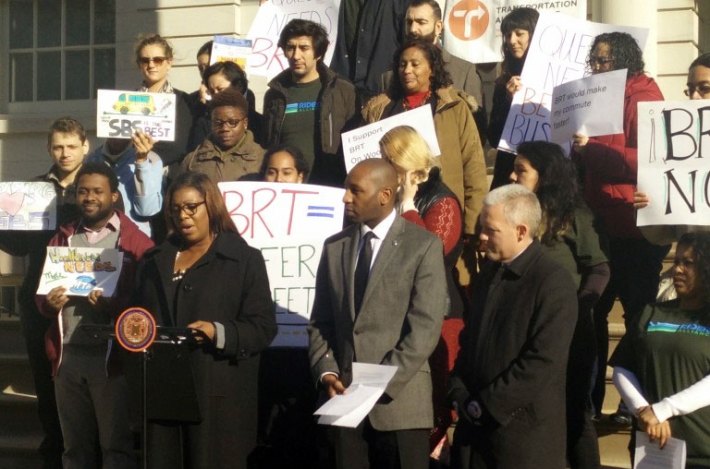
Public Advocate Letitia James joined Council Majority Leader Jimmy Van Bramer, Council Member Donovan Richards, and Queens transit activists on the steps of City Hall this morning to push the de Blasio administration to follow through on its plans for better bus service along Woodhaven Boulevard.
Earlier this year, DOT presented plans for bus lanes and pedestrian safety improvements along 14 miles of Woodhaven Boulevard and Cross Bay Boulevard [PDF], from Jackson Heights to the Rockaways. The project would speed up the Q52 and Q53, which serve 30,000 passengers each weekday but currently spend just 57 percent of the time in motion. New pedestrian islands and medians are also expected to reduce injuries on one of the deadliest streets in the city.
The rally comes at an important moment. While Richards and several other council members have called for full-fledged Bus Rapid Transit on Woodhaven Boulevard, the reallocation of street space from cars to buses is encountering some resistance in the neighborhood of Woodhaven.
With capital construction not set to begin until 2017, the implementation process is going to last at least two more years. The rally was a reminder that support for overhauling Woodhaven Boulevard runs deep, sending a message that DOT and City Hall shouldn't buckle to pressure to water down the project. The BRT for NYC Coalition has now collected 7,000 signatures in favor of it.
For sections of Woodhaven and the Rockaways where high poverty rates couple with long commute times, said Richards, the project "is a transit equity issue."
“It’s unfair that we’re still fighting for BRT in our areas when we need it so much,” Woodhaven resident Stephanie Veras told the crowd.
James said she's familiar with the fear of changing a street, which she encountered when she was a council member and Select Bus Service rolled out on the B44. “It’s really an education process," she said. "It’s about responding to these individuals who have concerns.”
After the rally, Veras said that process shouldn't obstruct making much-needed transit improvements. "People are reluctant to change -- it’s human," she said. “We have to keep pushing. The biggest challenge is car riders who don’t want BRT.”






